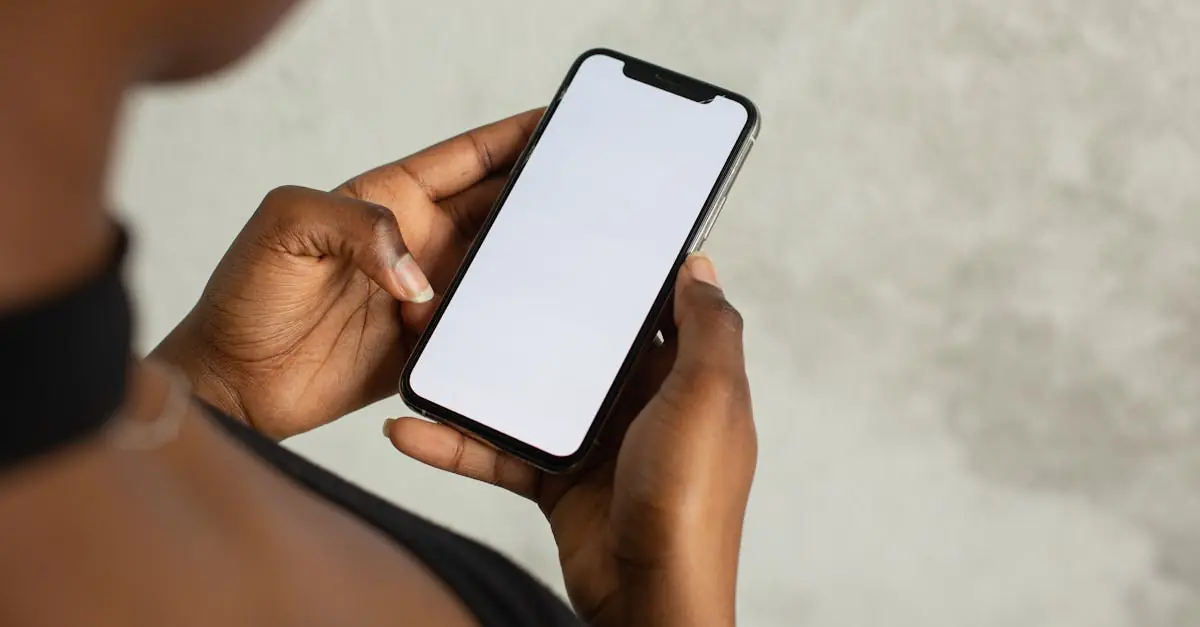In today’s fast-paced world, juggling appointments feels like a circus act without a safety net. Enter mobile scheduling apps, the trusty sidekicks that turn chaotic calendars into organized masterpieces. With just a few taps, they transform scheduling from a headache into a breeze, ensuring no one misses that all-important meeting or brunch with friends.
Imagine a life where double bookings and forgotten commitments are relics of the past. These apps not only keep you on track but also add a sprinkle of humor to your day—because who wouldn’t want a scheduling assistant that cracks a joke while setting reminders? Whether you’re a busy professional or a social butterfly, mobile scheduling apps are here to save the day, one appointment at a time.
Table of Contents
ToggleOverview of Mobile Scheduling Apps
Mobile scheduling apps facilitate efficient time management by enabling users to organize appointments and tasks. Users benefit from the ability to access their calendars anytime, ensuring they never miss important commitments. With features like reminders and notifications, these apps help streamline scheduling and improve productivity.
Many mobile scheduling apps offer integrations with other platforms, such as email and project management tools. This interconnectedness simplifies the scheduling process, allowing for seamless updates and real-time collaboration. Some users enjoy customizable options that cater to their specific needs, ensuring a tailored experience.
Various mobile scheduling apps present unique functionalities, appealing to different user preferences. Features often include color-coded calendars and visual layouts, making it easier to identify tasks at a glance. Some apps also incorporate innovative elements, such as automated scheduling based on user preferences and availability.
The use of mobile scheduling apps is prevalent among professionals and social users alike. By utilizing these tools, individuals maintain a better work-life balance, minimizing stress related to scheduling conflicts. Overall, mobile scheduling apps play a crucial role in modern time management, supporting users in their pursuit of organization and efficiency.
Key Features of Mobile Scheduling Apps
Mobile scheduling apps offer several features that enhance user experience and streamline planning. Understanding these features helps users maximize their effectiveness.
User Interface and Experience
Intuitive design characterizes most mobile scheduling apps. Clean layouts and easy navigation allow users to schedule appointments quickly. Customizable views provide options such as daily, weekly, or monthly displays. Quick access to upcoming events ensures users stay organized. Responsive design accommodates various devices, making it convenient for users on the go. Engaging features like color-coded calendars assist in visual organization, enhancing the overall user experience. Users often find helpful tutorials or tips embedded within the app, providing guidance for maximizing functionalities.
Integration with Other Tools
Seamless integration stands as one of the key benefits of mobile scheduling apps. Many platforms link with popular email services, allowing easy appointment confirmations. Real-time updates with project management tools enable efficient collaboration among teams. This functionality reduces the risk of miscommunication regarding schedules. Calendar sharing options promote transparency among family members or coworkers. Importing events from other calendars simplifies the transition for new users. These integrations streamline workflow, ensuring users maintain productivity without switching between different applications.
Popular Mobile Scheduling Apps
Mobile scheduling apps come in various forms, each offering unique features to enhance productivity. They simplify appointment management and improve time organization for users.
App 1: Features and Pricing
App 1 provides a user-friendly interface with customizable calendar views. Its key features include automated scheduling, reminders, and color-coded events. Pricing starts at $10 per month, with a free trial available for new users. Integrations with email platforms enhance user experience, ensuring timely notifications. Users appreciate mobile access, allowing them to manage appointments on-the-go.
App 2: Features and Pricing
App 2 focuses on collaboration, making it ideal for teams. This app offers shared calendars, enabling multiple users to coordinate schedules seamlessly. Features like event polling streamline decision-making for group meetings. Pricing varies, starting at $15 per month for individuals, with discounts for teams. Users value its compatibility with project management tools, improving workflow efficiency.
App 3: Features and Pricing
App 3 targets individuals seeking simplicity and convenience. This app features straightforward navigation and essential functionalities, like drag-and-drop scheduling. Pricing remains competitive at $8 per month, with an option for a free version with limited features. Users benefit from its integration with various calendars, reducing scheduling conflicts easily. Notifications ensure that users stay updated on upcoming events without hassle.
Benefits of Using Mobile Scheduling Apps
Mobile scheduling apps enhance efficiency in managing appointments and organizing calendars. Users gain immediate access to their schedules anywhere, preventing missed commitments. Features like reminders and notifications ensure timely awareness of upcoming events.
Additionally, the ability to integrate with email and project management tools allows for real-time updates. Customizable options, such as color-coded calendars, provide personalization that matches individual preferences. These visual cues simplify organization and help prioritize tasks.
Intuitive designs and clean layouts enhance the user experience, making appointment scheduling quick and straightforward. Easy navigation allows for rapid adjustments, ensuring flexibility in changing plans as needed. Calendar sharing options foster collaboration among teams and individuals, reducing the likelihood of scheduling conflicts.
Moreover, mobile scheduling apps contribute to better work-life balance by alleviating scheduling stress. Users appreciate the capability to view multiple calendars simultaneously, allowing a comprehensive overview of their commitments. Event polling features in some apps facilitate group scheduling, streamlining the decision-making process.
Prevalence among professionals and social users highlights the versatility of these tools across various contexts. With options tailored for specific needs, mobile scheduling apps serve as essential resources for anyone looking to improve time management. Overall, these applications significantly bolster organization and efficiency, addressing the demands of modern life effectively.
Considerations When Choosing an App
Selecting the right mobile scheduling app involves several crucial factors. First, assess the app’s features. Look for functionalities like reminders, notifications, and integration with email and project management tools. These features contribute significantly to enhancing efficiency and productivity.
Next, consider user interface design. An intuitive layout and easy navigation are essential. Users benefit from a clean design that allows swift scheduling without confusion. Clarity in the app’s interface often influences overall satisfaction.
Evaluate customization options as well. Many users prefer color-coded calendars and tailored views to match personal preferences. Apps that offer flexibility in presentation appeal more to diverse user needs.
Additionally, think about pricing structures. Some apps charge a monthly fee, starting around $8, while others may reach $15 or more. Compare pricing against the features offered to ensure value.
Check the app’s compatibility with other platforms as well. Seamless integration with existing systems enhances the scheduling experience. Users find it easier to stay organized when all tools work well together.
Finally, consider customer support options. Reliable support can resolve issues quickly, ensuring users get the most from their app. Look for resources like FAQs, tutorials, or responsive help desks.
Prioritizing these considerations leads to a more effective choice, helping users manage their time better in today’s fast-paced world.
Conclusion
Mobile scheduling apps have become indispensable for anyone looking to streamline their time management. By simplifying appointment setting and enhancing organization, these tools empower users to navigate their busy lives with ease. The integration of engaging features and intuitive designs ensures a smooth user experience that caters to various needs.
As individuals and teams strive for better work-life balance, the right scheduling app can make a significant difference. With the ability to customize options and collaborate seamlessly, these apps not only reduce stress but also improve productivity. Choosing the right mobile scheduling app can transform how one manages their time and commitments in today’s fast-paced environment.







